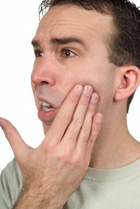 It’s very easy to overlook dental hygiene and rely on the dentist to solve any complications when they arise and restore the health of the teeth again, according to a central Leeds dentist. But what happens in the mouth, can affect the rest of the body and any oral infections and disease can lead to very serious health issues. Bacteria are a constant danger to our teeth and if unchecked, can lead to dental caries (or cavities) and then pain, disease, tooth loss and infection- in some cases, death. Caries attack the tooth in three different ways. The first is on the top of the tooth where the enamel folds into crevasses and is the most difficult area to clean. If plaque is allowed to build up, the bacteria will slowly form cavities and these can be spotted visually. The second location is where the tooth reaches down to the gum (a white, chalky spot being a give away) and the third is the root- these can be detected by a radiograph and are more difficult to treat. The worst example is where cavities occur in a lot of teeth- rampant caries and children are at high risk to this, especially when new teeth are coming through. Common causes of caries are high sugar content foods and a bacteria promoting diet that leads to plaque and tartar, a dry mouth due to the lack of saliva (often due to the use of stimulants and/or smoking) and poor oral hygiene. If decay is detected, immediate treatment will be required. Depending on the extent of the problem, a filling is the most common solution. If the level of decay is bad, the tooth may require a root canal and in extreme cases, an extraction may be the only answer.
It’s very easy to overlook dental hygiene and rely on the dentist to solve any complications when they arise and restore the health of the teeth again, according to a central Leeds dentist. But what happens in the mouth, can affect the rest of the body and any oral infections and disease can lead to very serious health issues. Bacteria are a constant danger to our teeth and if unchecked, can lead to dental caries (or cavities) and then pain, disease, tooth loss and infection- in some cases, death. Caries attack the tooth in three different ways. The first is on the top of the tooth where the enamel folds into crevasses and is the most difficult area to clean. If plaque is allowed to build up, the bacteria will slowly form cavities and these can be spotted visually. The second location is where the tooth reaches down to the gum (a white, chalky spot being a give away) and the third is the root- these can be detected by a radiograph and are more difficult to treat. The worst example is where cavities occur in a lot of teeth- rampant caries and children are at high risk to this, especially when new teeth are coming through. Common causes of caries are high sugar content foods and a bacteria promoting diet that leads to plaque and tartar, a dry mouth due to the lack of saliva (often due to the use of stimulants and/or smoking) and poor oral hygiene. If decay is detected, immediate treatment will be required. Depending on the extent of the problem, a filling is the most common solution. If the level of decay is bad, the tooth may require a root canal and in extreme cases, an extraction may be the only answer.





 Wouldn’t it be just wonderful to walk into a room full of people and dazzle them with your smile and the demand for whiter teeth is on increase as we clamour to emulate the ‘showbiz’ look, writes a dentist in the city of Leeds. Well, it’s a lot easier than you think and in some cases, you don’t even have to visit the dentist. Home bleaching kits are proving very popular and for around £100, light treatment, around £400 or there is the rather more expensive option of veneers. With home bleaching, you will start by soaking an upper and lower gum shield in warm water and then apply them to the teeth to form the mould. Then they are filled with a mixed bleaching agent and re-applied to the teeth. The longer they are left on, the whiter the teeth, but this isn’t always a perfect method. A more popular procedure is the light intensive treatment. This can be done by a trained technician at home or at the dentist. If there are no gum problems, a rubber shield will be placed on the gums and then a gel coated onto the teeth. An intense light is shone onto the teeth, agitating the bleaching process into action. The final method is veneers, which is a better option if only the odd tooth is discoloured and generally come in two forms. A wafer thin lumineer is bonded over the tooth with barely any preparation required but they have a short span of 3-5 years. The stronger alternative is the porcelain veneer. Although this requires a lot more preparation, they can last up to 15 years and give a deeper and more natural look, (a veneer can be up to £400 per tooth). You do get what you pay for with each of these treatments, though the dearest aren’t always the best.
Wouldn’t it be just wonderful to walk into a room full of people and dazzle them with your smile and the demand for whiter teeth is on increase as we clamour to emulate the ‘showbiz’ look, writes a dentist in the city of Leeds. Well, it’s a lot easier than you think and in some cases, you don’t even have to visit the dentist. Home bleaching kits are proving very popular and for around £100, light treatment, around £400 or there is the rather more expensive option of veneers. With home bleaching, you will start by soaking an upper and lower gum shield in warm water and then apply them to the teeth to form the mould. Then they are filled with a mixed bleaching agent and re-applied to the teeth. The longer they are left on, the whiter the teeth, but this isn’t always a perfect method. A more popular procedure is the light intensive treatment. This can be done by a trained technician at home or at the dentist. If there are no gum problems, a rubber shield will be placed on the gums and then a gel coated onto the teeth. An intense light is shone onto the teeth, agitating the bleaching process into action. The final method is veneers, which is a better option if only the odd tooth is discoloured and generally come in two forms. A wafer thin lumineer is bonded over the tooth with barely any preparation required but they have a short span of 3-5 years. The stronger alternative is the porcelain veneer. Although this requires a lot more preparation, they can last up to 15 years and give a deeper and more natural look, (a veneer can be up to £400 per tooth). You do get what you pay for with each of these treatments, though the dearest aren’t always the best. On the High Street there are many beauty salons, they will make you look fresh with many new and old procedures on the skin, but now they are also offering whiter teeth in your lunch hour. A Central Leeds dentist has spoken out in favour of this method of getting a brighter smile. It is in affect a smile makeover, and the confidence it brings is often worth the procedure in itself. The cost will vary from salon to salon, but expect to pay around £400 as a norm. It takes just 3 sessions of fifteen minute treatments, with a cooling off period in between, but around an hour or so can be expected. It starts off with a soft shield being fitted to protect vulnerable flesh from getting burnt, then a gel is brushed onto the teeth and a special blue light is shined onto the gel. A reaction with the natural enamel makes the teeth whiter, and provided you follow the dietary advice you will have a beautiful smile and white teeth for a year. You can get a top up after 12 months, but provided you look after your teeth it could last even longer. Some technicians even do home visits as the machine isn`t that heavy and there aren`t any complicated procedures or pain killers involved. All you will feel is a little sensitivity to your teeth, along with a slightly warm feeling. The intense light is produced by a machine, and is directed via a beam straight onto the exposed area of your teeth, there are no known side effects.
On the High Street there are many beauty salons, they will make you look fresh with many new and old procedures on the skin, but now they are also offering whiter teeth in your lunch hour. A Central Leeds dentist has spoken out in favour of this method of getting a brighter smile. It is in affect a smile makeover, and the confidence it brings is often worth the procedure in itself. The cost will vary from salon to salon, but expect to pay around £400 as a norm. It takes just 3 sessions of fifteen minute treatments, with a cooling off period in between, but around an hour or so can be expected. It starts off with a soft shield being fitted to protect vulnerable flesh from getting burnt, then a gel is brushed onto the teeth and a special blue light is shined onto the gel. A reaction with the natural enamel makes the teeth whiter, and provided you follow the dietary advice you will have a beautiful smile and white teeth for a year. You can get a top up after 12 months, but provided you look after your teeth it could last even longer. Some technicians even do home visits as the machine isn`t that heavy and there aren`t any complicated procedures or pain killers involved. All you will feel is a little sensitivity to your teeth, along with a slightly warm feeling. The intense light is produced by a machine, and is directed via a beam straight onto the exposed area of your teeth, there are no known side effects. A toothache is a very common thing and our first impulse is to let it ride. Most of you are terrified to go to dentists, thanks to negative experiences from our childhood. As a result of this irrational fear, we are putting ourselves in harm’s way for no good reason at all. Dental phobia is a big problem in a lot of people and it results in them having pain due to their having neglected a small problem.
A toothache is a very common thing and our first impulse is to let it ride. Most of you are terrified to go to dentists, thanks to negative experiences from our childhood. As a result of this irrational fear, we are putting ourselves in harm’s way for no good reason at all. Dental phobia is a big problem in a lot of people and it results in them having pain due to their having neglected a small problem. Teeth whitening has taken over from tanning as the `must have` fashion accessory, and it isn`t that expensive to have says a Central Leeds dentist. The market place is awash with different methods of doing this, from home kits to professionally trained technicians working in Beauty Salons and even in the home. Let’s look at the home self whitening kits first; they come with all you need to do this at home and safely. The kit includes a mouth gum shield and the bleaching agent mix that will do the actual job required. First you need to make a mould of your teeth, to do this you soak the shield in hot water and then when it is soft you simply bite into it. This makes the mould of your teeth; you then fill the mould with some of the bleach and then place it on your teeth and leave for around 40 minutes. This can be repeated whenever you need a top up, and it is quite effective on most teeth that are slightly discoloured. The other method is to use an intense light source to do the job; this is available in most salons on the High Street. It needs a technician to operate the machine, and it takes around an hour to do in 3 x 15 minute sessions. A gel is pasted on the teeth, and a rubber shield protects the rest of the mouth and lips, a light source is shone on the gel and it reacts with your teeth’s natural enamel to whiten them, it’s that simple.
Teeth whitening has taken over from tanning as the `must have` fashion accessory, and it isn`t that expensive to have says a Central Leeds dentist. The market place is awash with different methods of doing this, from home kits to professionally trained technicians working in Beauty Salons and even in the home. Let’s look at the home self whitening kits first; they come with all you need to do this at home and safely. The kit includes a mouth gum shield and the bleaching agent mix that will do the actual job required. First you need to make a mould of your teeth, to do this you soak the shield in hot water and then when it is soft you simply bite into it. This makes the mould of your teeth; you then fill the mould with some of the bleach and then place it on your teeth and leave for around 40 minutes. This can be repeated whenever you need a top up, and it is quite effective on most teeth that are slightly discoloured. The other method is to use an intense light source to do the job; this is available in most salons on the High Street. It needs a technician to operate the machine, and it takes around an hour to do in 3 x 15 minute sessions. A gel is pasted on the teeth, and a rubber shield protects the rest of the mouth and lips, a light source is shone on the gel and it reacts with your teeth’s natural enamel to whiten them, it’s that simple. You can now get your teeth whitened by a technician rather than a dentist; although dentists do still perform this procedure says a Central Leeds dentist. It is done in most salons that you`ll find in the Yellow Pages and on the High Street. The method uses a bright blue intense light to make the teeth`s natural enamel react and whiten your teeth. You will need to have fairly decent gums as well, the procedure starts with an inspection of your teeth and gums, heavily stained teeth may not qualify, but most teeth do. A mouth guard is fitted to protect your inner mouth, tongue and lips, the intense light will burn them otherwise. A gel is then pasted onto your teeth and you will get 3 sessions of around 15 minutes each, with a cooling off period in between. You will need to adhere to a strict dietary regime for a few weeks, this mean you cannot eat or drink anything that will re-stain your teeth again before the process settles down. This will include coffee, tea and red wine especially, but the sacrifice is worth it as it will give you a really bright and healthy looking appearance to your smile. The cost is anywhere between £200-400 depending on where you shop and what is on special offer, the whiteness will last around 12 months if you are careful what you put in your mouth and chew. All in all this method is really quite good and will bring you a new confidence with your Hollywood smile.
You can now get your teeth whitened by a technician rather than a dentist; although dentists do still perform this procedure says a Central Leeds dentist. It is done in most salons that you`ll find in the Yellow Pages and on the High Street. The method uses a bright blue intense light to make the teeth`s natural enamel react and whiten your teeth. You will need to have fairly decent gums as well, the procedure starts with an inspection of your teeth and gums, heavily stained teeth may not qualify, but most teeth do. A mouth guard is fitted to protect your inner mouth, tongue and lips, the intense light will burn them otherwise. A gel is then pasted onto your teeth and you will get 3 sessions of around 15 minutes each, with a cooling off period in between. You will need to adhere to a strict dietary regime for a few weeks, this mean you cannot eat or drink anything that will re-stain your teeth again before the process settles down. This will include coffee, tea and red wine especially, but the sacrifice is worth it as it will give you a really bright and healthy looking appearance to your smile. The cost is anywhere between £200-400 depending on where you shop and what is on special offer, the whiteness will last around 12 months if you are careful what you put in your mouth and chew. All in all this method is really quite good and will bring you a new confidence with your Hollywood smile. Each of our teeth is secured firmly to the jaw bone by one or more roots which contain a mass of blood vessels and nerves otherwise called the pulp. A root canal treatment is done when this pulp gets infected by microorganisms; this can happen when there is sudden trauma or injury to the tooth or due to tooth decay or cavity which is left untreated. Sometimes the pulp also gets infected when the tooth filling has cracked or fallen off due to wear and tear.
Each of our teeth is secured firmly to the jaw bone by one or more roots which contain a mass of blood vessels and nerves otherwise called the pulp. A root canal treatment is done when this pulp gets infected by microorganisms; this can happen when there is sudden trauma or injury to the tooth or due to tooth decay or cavity which is left untreated. Sometimes the pulp also gets infected when the tooth filling has cracked or fallen off due to wear and tear. Getting complicated dental procedures done is no longer the preserve of adults. It is extremely unfortunate that even children have to undergo difficult dental procedures because the incidence of dental caries among very little children is on the rise. This can very clearly be attributed to parental carelessness in allowing them to eat a lot of sugary foods and to a neglect of their oral hygiene.
Getting complicated dental procedures done is no longer the preserve of adults. It is extremely unfortunate that even children have to undergo difficult dental procedures because the incidence of dental caries among very little children is on the rise. This can very clearly be attributed to parental carelessness in allowing them to eat a lot of sugary foods and to a neglect of their oral hygiene. Periodontitis is the term given to infections of the gums. This is a very serious ailment and it can lead to bone loss as well as loss of teeth. A City of Leeds dentist points out that this disease is more serious in the case of people who have diabetes. As a result, a diabetic person has to take more care of their oral hygiene in order to protect themselves from this disease.
Periodontitis is the term given to infections of the gums. This is a very serious ailment and it can lead to bone loss as well as loss of teeth. A City of Leeds dentist points out that this disease is more serious in the case of people who have diabetes. As a result, a diabetic person has to take more care of their oral hygiene in order to protect themselves from this disease. Oral hygiene isn`t a thing we can take lightly, a City ofl Leeds dentist explains. It is a necessary tool in war against premature tooth decay, which is caused mostly by a lax regime that allows the enemy to multiply. The enemy of your teeth is the bacteria that comes with our food, we can`t eliminate that in the food, but we can stop it feeding and producing harmful acid. Acid is the foremost reason for early tooth decay, and it is easily kept under control with a simple, but affective oral hygiene regime. This must be kept up during the day as well as in the morning and just before bedtime. Night time is when the saliva gland dries up and allows the acid to accumulate the most, therefore doing the most damage; saliva will act as an alkali to the acid and prevent it eating away at the tooth enamel. It is so important to keep this in mind when you are cleaning your teeth at night, first of all give your teeth a good flossing, get right in between those molars. Removing the food debris will starve the bacteria and prevent them not only producing acid, but also producing tartar which will be deposited onto your teeth. If I tell you that tartar is dead bacteria, then that should help you be more rigid in your dental oral cleaning regime. Next you will need to vigorously brush the teeth, again getting in between them and removing even more food build up, and finally a good rinse will remove whatever is left.
Oral hygiene isn`t a thing we can take lightly, a City ofl Leeds dentist explains. It is a necessary tool in war against premature tooth decay, which is caused mostly by a lax regime that allows the enemy to multiply. The enemy of your teeth is the bacteria that comes with our food, we can`t eliminate that in the food, but we can stop it feeding and producing harmful acid. Acid is the foremost reason for early tooth decay, and it is easily kept under control with a simple, but affective oral hygiene regime. This must be kept up during the day as well as in the morning and just before bedtime. Night time is when the saliva gland dries up and allows the acid to accumulate the most, therefore doing the most damage; saliva will act as an alkali to the acid and prevent it eating away at the tooth enamel. It is so important to keep this in mind when you are cleaning your teeth at night, first of all give your teeth a good flossing, get right in between those molars. Removing the food debris will starve the bacteria and prevent them not only producing acid, but also producing tartar which will be deposited onto your teeth. If I tell you that tartar is dead bacteria, then that should help you be more rigid in your dental oral cleaning regime. Next you will need to vigorously brush the teeth, again getting in between them and removing even more food build up, and finally a good rinse will remove whatever is left.

